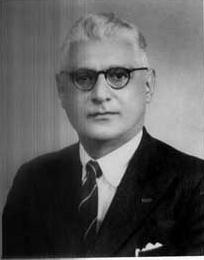Ahmed Ghulamali Chagla
| Ahmed Ghulam Ali Chagla احمد غلام علی چھاگلہ |
|
|---|---|
 |
|
| Background information | |
| Born | 31 May 1902 (Karachi, British India) |
| Origin | Karachi, Pakistan |
| Died | 5 February 1953 (aged 50) (Karachi, Pakistan) |
| Genres | National anthem, Instrumental, Classical, |
| Occupation(s) | Composer, musician, writer |
| Years active | 1922 - 1953 |
Ahmed Ghulam Ali Chagla (Urdu: احمد غلام علی چھاگلہ) (born 31 May 1902 - died 5 February 1953) was a Pakistani musical composer who famously wrote the musical composition for the national anthem of Pakistan in 1950. A scholar and writer, he was also an active member of the Theosophical Society.
Chagla was born into a prominent Karachi family. His father, Ghulam Ali Chagla, was the third elected president of the municipality of Karachi, serving from 1921 to 1922. Ahmed Chagla attended the Sindh Madrassat-ul-Islam in Karachi and took lessons in classical Indian music in 1910 and western musical composition in 1914.
Chagla became interested in the study of the theory of music (both eastern and western). In 1922, he began studying eastern and western systems of music under the famous art critic James Cousins. He was particularly interested in points of contact between the two systems. Chagla undertook several journeys to gain an insight of various eastern systems of music. In 1923, he travelled from Karachi to Iraq, via Balochistan and northern Iran (including the Caspian Sea, Teheran, Tabriz and Kermanshah). After touring Iraq, he returned to Karachi by way of Basra. In 1928 he qualified from Trinity College of Music in London.
In 1929, Chagla undertook an overland journey from Europe to Karachi to study how far west the influence of eastern music extended. Amongst the countries he visited were Germany, Czechoslovakia, Hungary, Turkey, Syria, Palestine and Iraq. Chagla gained considerable practical experience from opera houses and symphony orchestras along the way. In addition to classical music, Chagla became proficient in orchestral, operatic classical composing and conducting of western music. This journey was followed by two more visits to Europe in 1935 and 1938.
...
Wikipedia
